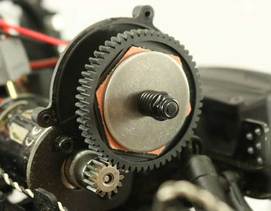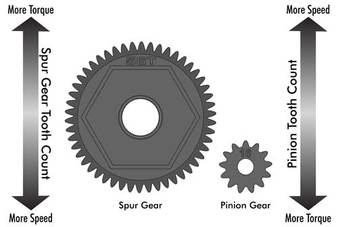
Understanding Gearing: By Tony Phalen on Apr 24, 2017 Axial Blog
Moving your rig is a pretty simple process; when you apply throttle from your radio, the ESC draws juice from the battery and directs it to the motor. As the motor spins, it rotates a series of gears that ultimately drives your vehicle forward.
CHANGING THE GEARING
Let’s say you want to increase the speed or torque of the vehicle; this can be done by simply changing the gearing. There are two gears that we work with to modify this; the pinion gear and the spur gear. The pinion gear is attached to the motor’s output shaft while the spur gear is attached to an output shaft on the transmission.
Changing these gears alters the ‘gear ratio’; a higher ratio equals more torque and acceleration but less top speed while a lower ratio equals less torque and a higher top speed. It is also good to note that a lower ratio can also build more heat, so it’s a good idea to monitor after changing the gearing.
GEAR PITCH
Pitch denotes the size of the teeth on a gear; the lower the number, the bigger the teeth. For example, most Axial rigs come with 32P (32 Pitch) gears. These gears have large, strong teeth on them, perfect for high-torque applications. Then there’s 48P, a slightly smaller tooth that is a good combination of efficiency and strength. Finally, there’s 64P. These gears find their way into extremely fast onroad cars that are made for speed instead of torque. It’s safe to say you’ll never find these delicate gears in a crawing rig!
MOTOR CHANGES
If you decide to upgrade your motor from stock to something a little faster, you’ll need to adjust your gearing as well. Gearing is usually calculated for a specific motor (especially in an RTR) for a good combination of speed and torque. If you put a faster motor in your rig and don’t change the gearing to match, you could overheat your motor and/or ESC, resulting in a failure. See our comprehensive Axial Transmission Guide complete with gearing charts for all of our current vehicles.
STOCK GEARING
Below is the factory gearing that comes in our vehicles:
SCX10: 32P 13T Pinion / 56T Spur Gear
SCX10 II RTR: 32P 13T Pinion / 56T Spur Gear
Wraith: 32P 12T Pinion / 56T Spur Gear
SMT10: 32P 16T Pinion / 56T Spur Gear
Yeti: 32P 16T Pinion / 64T Spur Gear
Yeti SCORE Trophy Truck: 32P 16T Pinion / 64T Spur Gear
RR10 Bomber: 32P 12T Pinion / 64T Spur Gear
SCX10 II: 32P 15T Pinion / 56T Spur Gear
Moving your rig is a pretty simple process; when you apply throttle from your radio, the ESC draws juice from the battery and directs it to the motor. As the motor spins, it rotates a series of gears that ultimately drives your vehicle forward.
CHANGING THE GEARING
Let’s say you want to increase the speed or torque of the vehicle; this can be done by simply changing the gearing. There are two gears that we work with to modify this; the pinion gear and the spur gear. The pinion gear is attached to the motor’s output shaft while the spur gear is attached to an output shaft on the transmission.
Changing these gears alters the ‘gear ratio’; a higher ratio equals more torque and acceleration but less top speed while a lower ratio equals less torque and a higher top speed. It is also good to note that a lower ratio can also build more heat, so it’s a good idea to monitor after changing the gearing.
GEAR PITCH
Pitch denotes the size of the teeth on a gear; the lower the number, the bigger the teeth. For example, most Axial rigs come with 32P (32 Pitch) gears. These gears have large, strong teeth on them, perfect for high-torque applications. Then there’s 48P, a slightly smaller tooth that is a good combination of efficiency and strength. Finally, there’s 64P. These gears find their way into extremely fast onroad cars that are made for speed instead of torque. It’s safe to say you’ll never find these delicate gears in a crawing rig!
MOTOR CHANGES
If you decide to upgrade your motor from stock to something a little faster, you’ll need to adjust your gearing as well. Gearing is usually calculated for a specific motor (especially in an RTR) for a good combination of speed and torque. If you put a faster motor in your rig and don’t change the gearing to match, you could overheat your motor and/or ESC, resulting in a failure. See our comprehensive Axial Transmission Guide complete with gearing charts for all of our current vehicles.
STOCK GEARING
Below is the factory gearing that comes in our vehicles:
SCX10: 32P 13T Pinion / 56T Spur Gear
SCX10 II RTR: 32P 13T Pinion / 56T Spur Gear
Wraith: 32P 12T Pinion / 56T Spur Gear
SMT10: 32P 16T Pinion / 56T Spur Gear
Yeti: 32P 16T Pinion / 64T Spur Gear
Yeti SCORE Trophy Truck: 32P 16T Pinion / 64T Spur Gear
RR10 Bomber: 32P 12T Pinion / 64T Spur Gear
SCX10 II: 32P 15T Pinion / 56T Spur Gear


 RSS Feed
RSS Feed